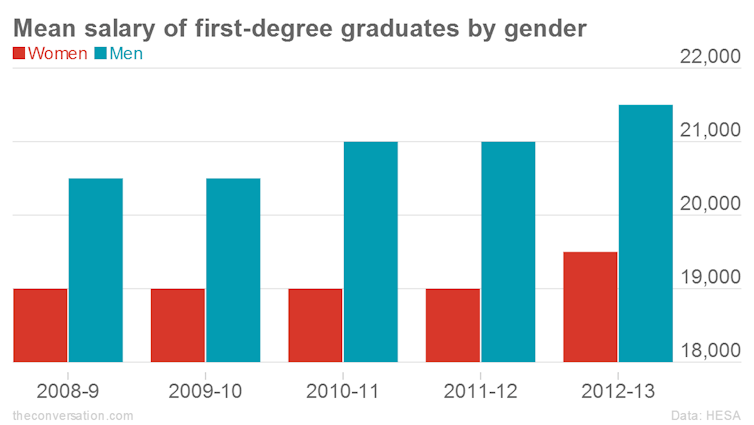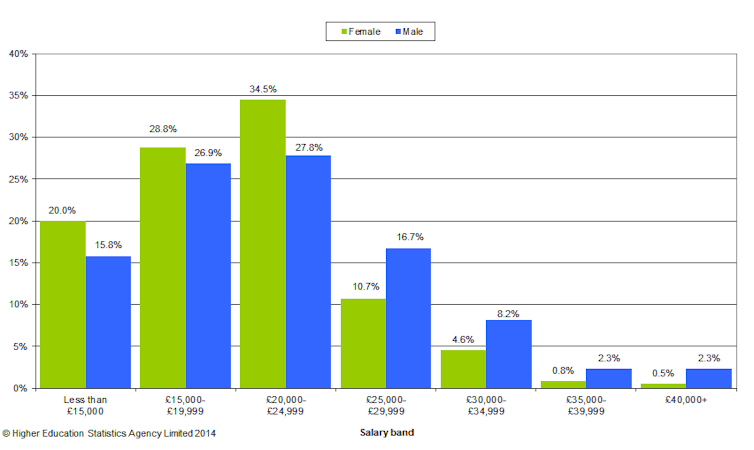The gender pay gap between women and men graduates has long been an indicator of pay disparities later along the career path. New data released by the Higher Education Statistics Agency has shown there is still a £2,000 gender gap in average graduate salaries six months after leaving a full-time university course – £19,500 for women and £21,500 for men.
While the median pay for graduates is now level at £20,000, men are still more likely to be the top earners and women the low earners. Curt Rice, head of Norway’s Committee on Gender Balance in Research and a professor at the University of Tromsø, say it’s important to keep in mind that the median salary is not the average. “While the median is the same, it’s clear from the data that the average salary for men is higher.”
Rice points to the fact that there are 50% more men than women earning between £25,000-£30,000 and nearly four times as many men as women earning more than £35,000.
Out of the 430,000 university graduates who answered the survey six months after graduating from a full time course, 66% disclosed their salary. The mean salary for both men and women has increased £500 for 2012-13 (as the graph below shows), but the difference still remains at £2,000 between men and women.
It’s worth noting that the survey has been expanded this year, and now includes more graduates from other types of higher education institutions, and so may not be directly comparable.

Further down the pay scale
For the first time since the 2008-2009 version of the survey, the median salary of graduates six months after leaving a full-time university course was the same for men as for women, at £20,000.
But the results show that women are still more likely to be in lower-paid jobs and there were more men in the higher salary bands (see graph below). Of those earning between £25,000 and £30,000, 16.7% were men and 10.7% were women, while for top-end earners making more than £40,000, 2.3% were men and 0.5% were women.

Kate Purcell, emeritus professor at the Warwick Institute for Employment Research, said “it’s always good news if we find there is greater parity,” but added that it looks like women “are considerably more likely to be skewed towards the lower end”. Purcell, who runs the the long-term Futuretrack project of graduate pay, points to a variety of reasons for the disparity. These include that women are less likely to study science and maths subjects, and are more likely to go into vocational courses such as nursing.
But Purcell says her current research has shown that even though women tend to leave university more highly qualified than men, they’re still likely to start out earning less. And further along the line, the pay gap widens. Her longitudinal study of people who graduated in 1995, found that while the pay gap between men and women’s average annual gross earnings was 11% in their first main job after graduating, it rose to 15% three years after, and 19% after eight years.
Purcell has also found that different careers have different dynamics. For example in law, she said the pay gap is exacerbated because “it’s men who are more likely to work in the higher paid legal end of the profession, like commercial law.”
Rice pointed to a number of reasons why the average salary for men is higher than for women, including that men negotiate more often than women when starting a job. “They are rewarded for that, while women are often punished for it, being perceived as bossy or demanding.”
He also said that research on implicit bias has demonstrated that when employers consider identical CVs, one with a man’s name, one with a woman’s and then hire both, they offer women on average just under 90% of the salary that they offer men.
Overall drop in unemployment
Overall, the survey showed that there had been a slight decrease in the number of graduates who remain unemployed six months after leaving university. In 2012-13, 6.2% of these full-time graduates were unemployed, compared to 7.1% in 2011-12. This pushed up the number of full-time employed to 57.% from 55.1%.
Male graduates from full-time degrees were more likely to be unemployed than women, with 9.5% out of work six months after graduating, compared to 6.1% of women.

